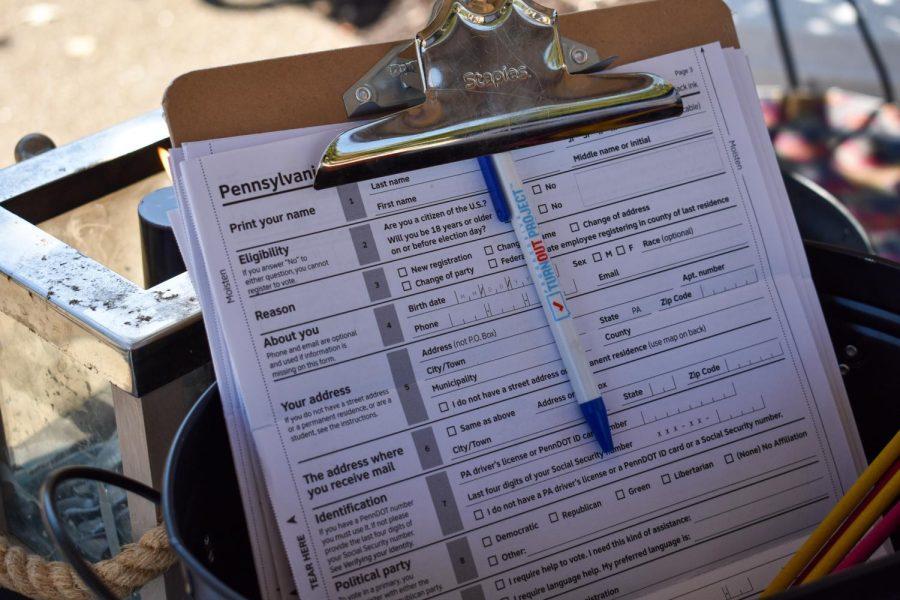Pennsylvania voting organizations register students as midterm election nears
Alyssa Carnevali | Staff Photographer
A close up of a Pennsylvania voter registration form.
October 11, 2022
Students like Kaed Rende, a member of Pitt Votes, use both in-person methods and social media to connect with students and get them to register to vote in time for the upcoming midterm election on Nov. 8.
“We are doing tabling as often as we can,” Rende, an education graduate student, said. “We also had an event for national voter registration day and we use our social media a lot, with resources pointing directly to specific bills that will be relevant to the election.”
As the voter registration deadline for Pennsylvania approaches on Oct. 24, many Pennsylvania organizations are working to get as many young voters registered as possible. At Pitt, many student organizations are also working to increase civic engagement among students, including Pitt Votes, the American Civil Liberties Union club and RISE at Pitt.
Rende works as the graduate student assistant for Pitt Votes and said they wanted to become involved with the organization because they have always valued the democratic process.
“There are obviously a lot of issues with access to the democratic process, especially with young people,” Rende said. “I think it is a great initiative to get as many students to register as possible, and we want to provide as much information as possible so that all students know what their rights are.”
Ben Wainwright, a sophomore political science major, said voting is one of the most important aspects of civil engagement, which is why he became involved with both the ACLU club and RISE at Pitt. He said he wants to take part in nonpartisan efforts that educates people about their voter rights
“Voting is a right, and that should be ensured to our peers,” Wainwright, a fellow at RISE and vice president of the ACLU club, said. “I want to make sure people have access to the information they need in order to go out and vote, essentially just making sure they are as educated as they can be going into it.”
According to Wainwright, RISE at Pitt focuses on voter planning, which specifically involves election day, making sure individuals know where their polling places are and understand all of their rights.
“If people don’t know the location of their polling place, when it is open or who and what is on the ballot, they don’t have the information they need to feel empowered on election day and that registration may be superfluous,” Wainwright said.
Hannah Kang, a first-year molecular biology major, said she became involved with voter registration and civic engagement prior to coming to Pitt when she joined the Woori Center — a Philadelphia-based grassroots organization — as an intern. Kang said the center works to engage Korean and Asian Americans and get them more involved in the political atmosphere.
“When I worked with them in high school, we would go to different places and engage with mainly immigrants, trying to get them civically engaged,” Kang said. “And while talking to them and telling them about their rights, it made me realize how important this process of voting truly is.”
Kang said she sees a need for all college students to become engaged in politics and knowledgeable about elections, but is specifically interested in helping the demographic her organization focuses on — Korean and Asian Americans.
“My organization targets that demographic because it is a minority, which means our voices are not heard as often and we do not have as many people representing us,” Kang said. “We are citizens of America, but still so many of us do not know about politics or become involved in it.”
According to Rende, the nature of current events in the United States and globally, especially regarding reproductive rights and climate change, have incited more student interest in the upcoming elections. They said students see these issues impacting them in their lives, and want to have a say in how these issues impact their future.
“A lot of people want to vote, especially with Pennsylvania being a swing state, because they see their vote as having more power and they want to have a say,” Rende said. “Some people are just really excited and see voting as really important.”
When it comes to getting students interested in registering, Wainwright said he tries to find an issue they are passionate about and use that as a way to pivot the conversation to certain candidates and the election. He said, in his experience, most students do care and are passionate about social and political issues, they are just unsure about how to get more involved or do not think their vote really matters.
“It’s not always that people just don’t care about politics, because they do,” Wainwright said. “They just don’t always think that they can be involved in politics because it’s far off, a source of partisanship or polarizing, when in reality they are involved in it every single day.”
According to Rende, young people have an important place in the political scene because they shape the future, but they still remain the group with the lowest engagement in elections.
“Young people are always going to have new information to offer and they absolutely deserve to have a say in what is going on in their future,” Rende said. “This is real life, engaging with voting and any other forms of democracy.”








